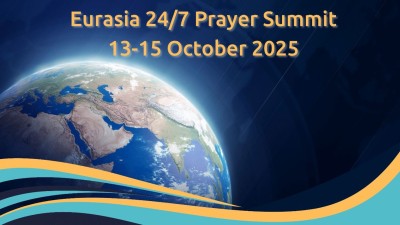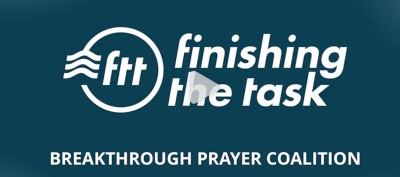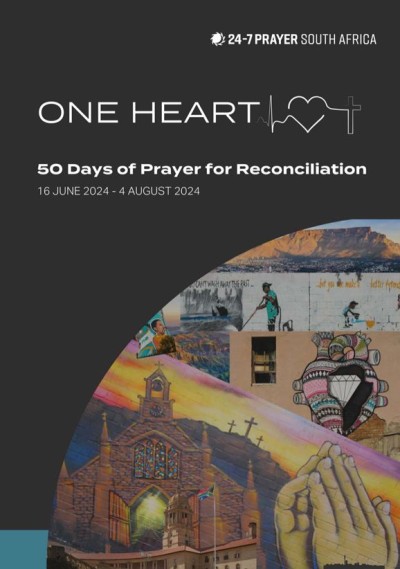Join the Eurasia 24/7 Prayer Summit – Called to the Wall!
13-15 October 2025 (Optional Prayer Journey on 16th) - Island of Malta
Across Europe and the Middle East, there’s a rising sense of urgency and hope. The spiritual heritage of these lands runs deep, and many believe we are standing on the threshold of a great awakening.
In this pivotal hour, Jericho Walls International Prayer Network and IPC warmly invite you to the Eurasia 24/7 Prayer Summit, taking place 13–15 October 2025 on the beautiful island of Malta.
The summit’s theme, “Called to the Wall,” echoes the powerful words of Isaiah 62:6-7:
“I have set watchmen on your walls, O Jerusalem; they shall never hold their peace day or night. You who make mention of the Lord, do not keep silent, and give Him no rest till He establishes and till He makes Jerusalem a praise in the earth.”
God is raising up watchmen—men and women who will not rest until Heaven touches Earth in Western Europe, Eastern Europe, and the Middle East. The Eurasia Summit is a gathering for those who carry a burden for prayer for revival in these regions. Leaders from every nation in this vast and diverse part of the world will gather in Malta to celebrate what God is doing and contend for what is yet to come.
This summit is part of a global movement, one of five strategic gatherings around the world, all carrying the same vision: to see 24/7 prayer established in every nation on earth by 2033.
The mission is clear—to encourage, equip, and empower leaders to build unceasing prayer in local churches, cities, and nations.
Whether you are a pastor, prayer leader, intercessor, or simply someone burning with a vision to see God move in your nation, this summit is for you. Let’s unite across borders, languages, and cultures to lift up one sound, one cry, one relentless prayer: “God, have Your way in our nations!”
Watch the video: https://youtu.be/C1_y6nitYfg
Join us in Malta this October. Let’s answer the call to the wall—together.
Click here for details and registration
Enquiries: Maulise Kotze E-mail: This email address is being protected from spambots. You need JavaScript enabled to view it. WhatsApp: +971589853594
An initiative of Jericho Walls International Prayer Network in collaboration with International Prayer Connect and other regional networks
Join the Finishing the Task Breakthrough Prayer Coalition!
“And pray for us, too, that God may open a door for our message, so that we may proclaim the mystery of Christ…” – Colossians 4:3
As we press on to finish the task of the Great Commission, we know this truth: prayer is the key to every other goal...
 It’s how we are led, strengthened, and empowered to do what Jesus has commanded us to do.
It’s how we are led, strengthened, and empowered to do what Jesus has commanded us to do.
That’s why we’re inviting you to become part of the FTT Breakthrough Prayer Coalition—a global prayer force believing God for unprecedented breakthroughs among the unreached.
When you join, you’ll receive monthly invitations to online prayer calls, prayer resources, and praise reports focused on:
- Specific unreached people groups still waiting to hear the Gospel
- Bible translation progress so every language can know God’s Word
- Church planting movements igniting transformation in hard-to-reach places
Jesus said in John 15:5, “Apart from Me you can do nothing.” Yet He also promises that “with God all things are possible!” (Matthew 19:26).
Join us as we lift fervent prayers for three key FTT initiatives:
- Pray for Zero: Over 220 million people still lack even a single verse of Scripture. Let’s intercede for translators and their crucial work.
- Pray for All: Imagine praying for every person on earth by name and sharing Jesus with them. Each believer praying for five people can help reach the world!
- Pray 110: Stand with us in prayer for the 110 most unreached cities, asking God to raise up thousands of vibrant, Christ-exalting churches.
Equip yourself with prayer training, resources, and join global prayer moments like Pentecost, One Miracle Night, and the Hindu Day of Prayer.
Be part of a global prayer movement working to fulfill the Great Commission. Join the FTT Breakthrough Prayer Coalition today—and help finish the task through prayer!
Links to all IPC Projects:
https://linktr.ee/ipcprayer
110 Cities Prayer
www.110cities.com | Daily Prayer Fuel Sign Up
Global Family 24-7 Prayer Room
https://www.globalfamily24-7prayer.org/
Prayer Covenant for Children Mobile App
theprayercovenant.org/mobileapp/
Interseed House of Prayer App
www.interseed.io
Eurasia Prayer Summit – 13-15 October 2025, Malta
www.asiaprayersummit.id
30 Days of Prayer for Israel & Iran
https://110cities.pray4movement.org/
15 Days of Prayer for the Hindu World
12-26 October 2025
https://110cities.com/hinduism/
Global Day of Prayer for the Hindu World
20th October 2025 – From 8am (EST)
https://110cities.com/hinduism/
Pentecost Global Day of Prayer Replays
VIEW AND WATCH ON YOUTUBE HERE
24-7 Week of Prayer – 1-7 September 2025
https://www.24-7prayer.com/weekofprayer
Fire on the Family Altar: Experience the Holy Spirit's Power in Your Home
“As the family goes, so goes the nation.”
Nations are in turmoil because of satan’s attack on the family. As countless households have surrendered to the slumbering spell of the spirit of this age, the world has increasingly fallen into decay. But there is hope! Destruction of this demonic agenda is possible, and it begins at home!
“Revival will come to a nation when the family altar is restored.” Cheryl Sacks, a dynamic Kingdom leader and prophetic intercessor, heard these words from the Lord. Today, she is wholeheartedly working to turn the tide by filling households across the nation with Holy Spirit power!
In Fire on the Family Altar, Cheryl offers prophetic decrees from scripture and practical instructions for restoring the family altar in your home, so you can operate in the strength that God created families to maintain within culture.
In this bold book, you will discover how to:
Pray supernatural prayers that catapult children into divine destiny.
Bring your household into encounters with the Holy Spirit.
Safeguard your family from the powers of darkness.
Raise up Kingdom reformers who will shape and impact every sphere of culture.
Don’t allow the spirit of this age to hold families captive any longer. One righteous family can make a difference! Restore the family altar in your home, and spark the flames of revival!
Available on Amazon
More info
Join the 24-7 Prayer for Revival – Raising a Godly Generation!
Jericho Walls International Prayer Network invites believers worldwide to unite in an extraordinary week of 24-7 prayer from 14th to 20th July 2025. Under the stirring theme “Shooting Arrows” (Psalm 127:4), this year’s focus is on raising a godly generation of young people aged 10 to 21. In a world where moral relativism clouds truth and biblical values are increasingly dismissed as optional, we as the Body of Christ are called to stand in the gap for the next generation.
This beautifully crafted prayer guide offers daily prayer themes—from resisting moral compromise, to embracing God’s absolute truth, to discovering personal purpose and calling. It draws powerful lessons from biblical heroes like Daniel, Timothy, Joseph, and ultimately Jesus Himself. Each day provides Scripture-based prayers both for and with young people, making this a perfect tool for families, churches, youth groups, and intercessors.
Our youth face countless pressures and confusing messages. Yet God’s Word promises that when we pray, He hears and answers. Imagine the impact of believers all around the world lifting up this generation in united, ceaseless prayer!
Don’t miss the chance to be part of this Kingdom effort. Download the guide, gather your family, your church, or your prayer group, and take time each day to pray over the highlighted themes. Let’s believe God for a revival that will shape young hearts to walk worthy of the Lord, be fruitful in every good work, and increase in the knowledge of God (Colossians 1:10).
Join us as watchmen on the walls. Let’s shoot arrows of faith, truth, and intercession into the heart of the next generation—for God’s glory and the fulfilment of His purposes on the earth!
Join the Online Global Prayer Movement with the Interseed App!
Imagine thousands of believers from every nation, tribe, and tongue united in prayer—lifting their voices day and night before the throne of God. With the Interseed Online House of Prayer app, this vision is becoming a reality.
Developed to mobilise united, Scripture-led prayer for the nations, Interseed is more than just an app—it’s a growing global prayer family.
Whether you're on a lunch break, commuting, or awake in the night, you can log in and instantly join with other followers of Jesus to intercede for cities, nations, unreached people groups, and urgent needs.
At the heart of the app is the Prayer Wall—a live feed where believers post real-time prayer requests and praise reports. You can respond with a tap, adding your voice to prayers already rising like incense before the Lord (Revelation 5:8). Every “amen” is a vote of faith in the power of God to move!
You’ll also find daily prayer points, themed prayer rooms, and video devotionals from prayer leaders around the world. Whether you're passionate about revival, mission, justice, healing, or the next generation, there’s a space for you to engage and grow in your calling as an intercessor.
Dr. Jason Hubbard, Director of International Prayer Connect, says:
"We’re witnessing a new era of global, united prayer—Interseed is helping us connect and pray as one Body across time zones and cultures."
We invite you to download the app, create a free account, and take your place in this extraordinary, end-time movement of prayer.
- Post your own prayer requests
Pray for others and mark them as prayed for
Join virtual prayer rooms focused on strategic regions
Receive real-time notifications for urgent global needs
Be strengthened and encouraged through community prayer
Let’s fill the airwaves with prayer. Let’s believe for awakening, revival, and the fulfilment of the Great Commission in our day.
Download the Interseed app today on iOS or Android
Visit https://interseed.io to learn more
Together, let’s build a canopy of prayer across the nations - until the earth is filled with the knowledge of the glory of the Lord!
50 Days of Prayer for Oneness and Reconciliation
“FATHER, MAKE THEM ONE” – John 17
The time is right for the Church to take the lead and assist our countries to heal. As Christians we owe the world a testimony. Let us move from fear, hatred and distrust to rebuilding the ruined walls, as in Nehemiah’s time, helping each other to overcome the past and walking in faith, believing that the King of Kings is still empowering us. Let us celebrate our shared identity in Christ.
We cannot change, transform or heal ourselves. Only the Triune God can do that. But then we need to spend time with Him and allow Him to speak to us.
In light of the need for healing and reconciliation and for our hearts to be prepared, this 50 Days of Prayer was initiated.
The 50 Days will start on 16 June and end on 4 August 2024.
Please join in this process of humbling ourselves before God so that God Himself can heal and reconcile us with Him and with one another.
More info / Download: https://jwipn.com/one-heart-prayer-for-reconciliation-16-jun-4-aug/
Cross necklace saves man’s life
Aidan Perry, a 20-year-old man from Florida, is praising God for saving his life after he was accidentally shot in the chest at close range on 7 June. The incident occurred when a friend was showing off a .40-calibre pistol that unexpectedly discharged. In the terrifying moments afterward, Aidan recalled seeing blood and fearing he would die. However, he credits both divine intervention and his cross necklace - a Christmas gift from his father - for his survival. Doctors confirmed that the necklace had deflected much of the bullet’s force, causing it to ricochet and lodge harmlessly in Aidan’s chest rather than striking vital organs. Aidan, who already had faith before this incident, said the experience has deepened his belief in God, reminding him to ‘never stop believing’. Meanwhile, the friend involved has been arrested and charged with culpable negligence causing injury.








